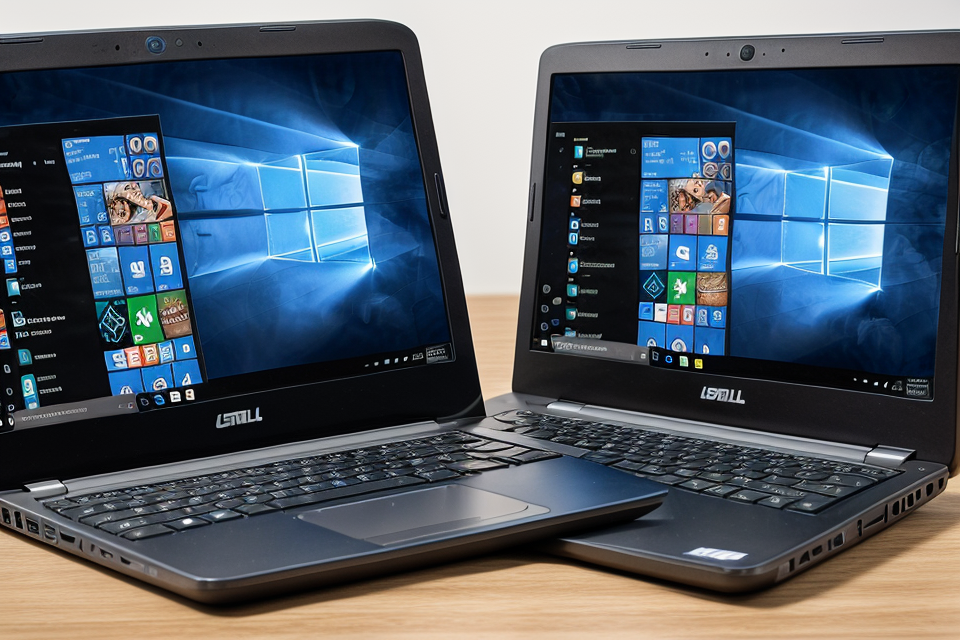A laptop is an essential tool for modern-day living, and it’s not uncommon for people to use their laptops for several years. But how long can you expect your laptop to last? The lifespan of a laptop can vary depending on several factors such as usage, maintenance, and quality of the device. In this article, we will explore the different factors that can affect the lifespan of a laptop and provide you with some useful tips on how to extend the life of your device. So, whether you’re in the market for a new laptop or looking to get the most out of your current one, read on to find out how long you can expect your laptop to last.
The lifespan of a laptop can vary depending on various factors such as usage, maintenance, and quality of the device. On average, a laptop can last between 3-5 years before needing to be replaced. However, some laptops can last much longer if they are well taken care of and have undergone regular maintenance. Factors such as regular software updates, cleaning of dust and debris, and avoiding extreme temperatures can all contribute to extending the lifespan of a laptop. Ultimately, the lifespan of a laptop will depend on a combination of factors, and it is important to regularly assess the performance of your device to determine when it may be time for an upgrade.
Factors Affecting Laptop Lifespan
Construction and Durability
The construction and durability of a laptop are critical factors that determine its lifespan. These aspects are influenced by several factors, including the materials used, design and build quality, and ruggedness and portability.
- Materials Used: The materials used in the construction of a laptop play a crucial role in determining its durability. For instance, laptops with a magnesium alloy chassis tend to be more durable than those made from plastic. Similarly, laptops with carbon fiber reinforced frames are generally more robust than those with aluminum frames. The type of keyboard and touchpad, as well as their durability, can also affect the lifespan of a laptop.
- Design and Build Quality: The design and build quality of a laptop are crucial in determining its lifespan. Laptops with a solid, sturdy design and build quality tend to last longer than those with a flimsy design. The hinges, in particular, are a critical component of a laptop’s build quality, and those that are well-built and reinforced tend to last longer than those that are not.
* Ruggedness and Portability: Laptops that are designed to be rugged and portable are typically more durable than those that are not. Laptops with rubberized surfaces, reinforced ports, and shock-absorbing materials tend to be more resistant to damage than those without these features. However, these features may add weight and bulk to the laptop, which can affect its portability.
In summary, the construction and durability of a laptop are crucial factors that determine its lifespan. The materials used, design and build quality, and ruggedness and portability are all important aspects to consider when determining how long a laptop is likely to last.
Usage and Maintenance
- Frequency of use: The more frequently a laptop is used, the faster it will wear out. Laptops are designed to handle a certain amount of wear and tear, but excessive use can cause damage to the hardware, such as the CPU, motherboard, and hard drive. Overheating is also a concern when a laptop is used for extended periods of time.
- Quality of care and maintenance: Regular maintenance can help extend the lifespan of a laptop. This includes cleaning the keyboard and screen, keeping the software up to date, and running diagnostic tests. Proper handling is also important, such as avoiding drops and bumps that can damage the internal components.
- Environmental factors: The environment in which a laptop is used can also affect its lifespan. For example, exposure to high temperatures, humidity, or dust can cause damage to the hardware. Laptops should be kept in a cool, dry place with minimal exposure to direct sunlight or other sources of heat.
In summary, the frequency of use, quality of care and maintenance, and environmental factors can all play a role in determining how long a laptop will last. By taking proper care of your laptop and using it responsibly, you can help extend its lifespan and keep it running smoothly for years to come.
Technological Advancements
The lifespan of a laptop is significantly influenced by technological advancements in hardware components. As technology continues to evolve, laptops are becoming more powerful, durable, and energy-efficient. Here are some factors that contribute to the longevity of laptops due to technological advancements:
- Evolution of hardware components: Over the years, there have been remarkable improvements in the performance and efficiency of hardware components, such as processors, memory, storage, and graphics cards. These advancements have enabled laptops to handle more demanding tasks and provide a better user experience. As a result, laptops today can last longer than their predecessors before requiring an upgrade.
- Upgradability and longevity of components: With the increasing focus on sustainability, manufacturers are designing laptops with upgradability in mind. Many modern laptops come with expandable storage, replaceable batteries, and even replaceable CPUs and GPUs. This means that users can extend the lifespan of their laptops by upgrading these components when necessary, rather than replacing the entire device.
- OS and software compatibility: The compatibility of operating systems (OS) and software is crucial in determining the lifespan of a laptop. As new OS versions and software are released, they may require more advanced hardware to run smoothly. Therefore, laptops with older hardware may become obsolete or struggle to run the latest software, limiting their lifespan. However, laptops with more powerful hardware can accommodate newer software and OS versions, prolonging their usefulness.
In conclusion, technological advancements have played a significant role in extending the lifespan of laptops. With the evolution of hardware components, upgradability, and compatibility, laptops can now last longer and remain relevant for more extended periods.
Extending Your Laptop’s Lifespan
Regular Maintenance
Maintaining your laptop is essential to prolong its lifespan. Regular maintenance can help identify and address potential issues before they become significant problems. Here are some tips for regular maintenance:
Cleaning and Dust Removal
Dust and debris can accumulate in your laptop’s vents and fans, leading to overheating and reduced performance. It is essential to regularly clean your laptop to prevent these issues. To clean your laptop, turn it off and unplug it from all power sources. Use a soft, dry cloth to gently wipe down the exterior of the laptop. Use compressed air to blow out any dust or debris from the vents and fans. Be careful not to use liquids or abrasive materials, as they can damage your laptop.
Updating Drivers and Firmware
Outdated drivers and firmware can cause compatibility issues and reduce the performance of your laptop. It is essential to regularly update your drivers and firmware to ensure optimal performance. Most laptops have built-in tools to update drivers and firmware automatically. However, if your laptop does not have these tools, you can manually download and install the updates from the manufacturer’s website.
Running Diagnostic Tests
Running diagnostic tests can help identify potential issues with your laptop’s hardware and software. Most laptops have built-in diagnostic tools that can check the system’s memory, storage, and other components. To run a diagnostic test, restart your laptop and press the appropriate key during startup to access the diagnostic tool. Follow the prompts to run the test and identify any potential issues. If the diagnostic tool identifies any issues, take your laptop to a professional for repairs.
Overall, regular maintenance is essential to prolong the lifespan of your laptop. By cleaning your laptop, updating drivers and firmware, and running diagnostic tests, you can identify and address potential issues before they become significant problems.
Repairs and Upgrades
One of the most effective ways to extend the lifespan of your laptop is by performing regular repairs and upgrades. Here are some of the key things you can do to keep your laptop in top condition:
- Identifying and fixing common issues: Over time, laptops can develop a range of issues, from software glitches to hardware failures. By identifying these issues early on and fixing them promptly, you can prevent more serious problems from developing. This might involve running diagnostic tests, checking for loose connections, or updating your operating system.
- Replacing parts for improved performance: If your laptop’s performance has started to slow down, it may be possible to improve it by replacing certain parts. For example, if your hard drive is full, you could replace it with a larger one. Similarly, if your CPU or RAM is no longer able to handle your computing needs, you could upgrade those components as well.
- Upgrading to newer components: Finally, if your laptop is starting to show its age, you may want to consider upgrading to newer components. This could involve replacing your old hardware with newer, more powerful parts, or adding additional features like a touchscreen or improved graphics card. By upgrading your laptop in this way, you can keep it running smoothly for years to come.
Safe Handling and Storage
Proper handling and storage of your laptop can significantly extend its lifespan. Here are some tips to keep in mind:
- Preventing physical damage: One of the most significant factors that can affect the lifespan of your laptop is physical damage. To prevent physical damage, it’s essential to handle your laptop with care. Avoid dropping your laptop, as this can cause significant damage to the internal components. Additionally, avoid subjecting your laptop to extreme vibrations, such as those caused by using it on a rough surface or placing it too close to a speaker.
- Storing your laptop properly: When not in use, it’s essential to store your laptop in a safe place. The best place to store your laptop is in a cool, dry environment, away from direct sunlight. Avoid storing your laptop in areas with high humidity, as this can cause damage to the internal components. Additionally, avoid stacking heavy objects on top of your laptop, as this can cause damage to the screen or keyboard.
- Avoiding exposure to extreme temperatures: Extreme temperatures can also damage your laptop’s internal components. Avoid exposing your laptop to direct sunlight or leaving it in a car on a hot day. Additionally, avoid placing your laptop too close to a heating or cooling vent, as this can cause damage to the internal components.
By following these simple tips, you can help extend the lifespan of your laptop and ensure that it continues to function optimally for years to come.
Making Your Laptop Last Longer
Buying Tips
When purchasing a laptop, it’s important to consider factors that can affect its longevity. Here are some buying tips to help you make a more informed decision:
- Choosing durable materials: Look for laptops made with high-quality materials that can withstand wear and tear. Examples include metal alloys, carbon fiber, and reinforced plastics. These materials may be more expensive, but they can help extend the life of your laptop.
- Opting for rugged designs: Some laptops are designed to be more durable than others. Look for models with reinforced corners, rubberized feet, and protective casings. These features can help protect your laptop from drops and bumps, which can cause damage over time.
- Assessing upgradability and component longevity: Consider how easily you can upgrade your laptop’s components, such as the CPU, RAM, and storage. Laptops with upgradable components can last longer, as you can upgrade them to keep up with new software and technology. Additionally, consider the longevity of individual components, such as the battery and keyboard, as these can have a significant impact on the overall lifespan of your laptop.
Proper Usage Techniques
Reducing wear and tear is an essential aspect of extending the lifespan of your laptop. This can be achieved by following proper usage techniques, such as managing power consumption and using the right cables and accessories.
Proper cables and accessories:
Using high-quality cables and accessories can significantly reduce wear and tear on your laptop. Here are some tips to keep in mind:
- Use only the power adapter that came with your laptop, as generic adapters may not meet the required specifications and could damage your device.
- Use a high-quality USB cable for charging your laptop or connecting external devices.
- Avoid using third-party batteries, as they may not meet the required safety standards and could potentially damage your laptop.
Managing power consumption:
Reducing power consumption can also help extend the lifespan of your laptop. Here are some ways to reduce power consumption:
- Adjust the brightness of your laptop screen to save power.
- Use a power strip with a surge protector to prevent power spikes from damaging your laptop.
- Put your laptop into sleep mode or hibernation when not in use.
- Consider using a laptop cooling pad to reduce the risk of overheating.
Reducing wear and tear:
Reducing wear and tear on your laptop is essential to its longevity. Here are some tips to reduce wear and tear:
- Avoid using your laptop on uneven surfaces, as this can cause the device to vibrate and wear down the components.
- Clean your laptop regularly to prevent dust and debris from accumulating and causing damage.
- Avoid exposing your laptop to extreme temperatures, as this can cause damage to the components.
- Avoid carrying your laptop by the screen, as this can cause damage to the display.
By following these proper usage techniques, you can significantly extend the lifespan of your laptop and ensure that it continues to function smoothly for years to come.
Timely Upgrades
Maintaining your laptop’s performance and longevity requires timely upgrades. This section will discuss how staying current with technology, replacing outdated components, and adapting to new software and OS requirements can extend the life of your laptop.
- Staying current with technology: The pace of technological advancements is rapid, and it’s crucial to keep up with the latest hardware and software updates. Regularly updating your operating system, drivers, and security software will not only improve your laptop’s performance but also enhance its overall security. By keeping your laptop’s software up-to-date, you can avoid potential issues that may arise from outdated systems.
- Replacing outdated components: As your laptop ages, some components may become outdated or inefficient. For instance, the hard drive or RAM may not be able to handle the demands of newer software or applications. In such cases, replacing these components can significantly improve your laptop’s performance. For instance, upgrading to an SSD can enhance your laptop’s boot time, while adding more RAM can improve multitasking capabilities.
- Adapting to new software and OS requirements: Software developers continuously release updates that require newer hardware and software specifications. Therefore, it’s important to adapt to these changes by upgrading your laptop’s components or replacing it altogether. This ensures that your laptop can run the latest software and applications, preventing potential compatibility issues.
By following these timely upgrades, you can extend the life of your laptop and maintain its performance for a longer period.
FAQs
1. How long can I expect my laptop to last?
The lifespan of a laptop can vary depending on several factors such as usage, maintenance, and quality of the device. On average, a laptop can last anywhere from 3 to 7 years, but some may last longer or shorter than that. Factors such as regular updates, backups, and proper care can extend the life of your laptop.
2. What are the signs that my laptop is nearing the end of its life?
There are several signs that your laptop may be nearing the end of its life, including slow performance, frequent crashes, and difficulty starting up. If your laptop is more than 5 years old, it may be time to consider replacing it. However, if it is still functioning properly and meets your needs, there is no rush to replace it.
3. How can I extend the life of my laptop?
There are several ways to extend the life of your laptop, including regular updates, backups, and proper care. Regular updates can help keep your laptop running smoothly and address any security vulnerabilities. Backups can help protect your data in case of hardware failure or other issues. Proper care includes avoiding extreme temperatures, protecting your laptop from physical damage, and avoiding heavy use.
4. What factors can affect the lifespan of a laptop?
Several factors can affect the lifespan of a laptop, including usage, maintenance, and quality of the device. Devices that are used heavily or subjected to rough handling may have a shorter lifespan than those that are used more gently. Proper maintenance, including regular updates and backups, can help extend the life of your laptop. The quality of the device can also play a role, with higher-quality laptops generally lasting longer than lower-quality ones.



